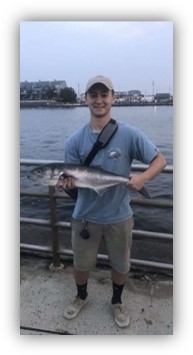
Jake DeGennaro and Alexander Iorio are lifelong friends. They’re also avid recreational fishermen who noticed a problem with their pastime that was literally dangling right in front of them.
“Jake and I were fishing together on the Delaware River and right in the trees above our heads you could see all this tangled fishing line just hanging there,” says Iorio. “We were talking about how unfortunate it was that that fishing line was probably going to be there forever.”
If left untouched, DeGennaro says, waste fishing line can take 600 years to fully decompose. And imagine this: if all fishermen left behind three inches of line per year (a gross underestimate, he notes), the length of the discarded line would extend roughly 2,350 miles. To put it in perspective, that would stretch from TCNJ’s campus in Ewing to the outskirts of Los Angeles, California.
The pair of engineering majors — DeGennaro, mechanical and Iorio, civil — are now on an entrepreneurial mission to protect our planet with a simple and effective tool to collect waste fishing line.
Their invention, The Vortex, wraps discarded fishing line into a tight spool, making it easy to collect and properly dispose of.

DeGennaro and Iorio took advantage of TCNJ’s Mayo Business Plan Competition for guidance, and ultimately funding, to getting their project off the ground.
“We’ve both always had a passion for inventions and ideas and perhaps one day starting a business,” says Iorio. “Learning the steps to create our own business plan was very enjoyable and educational.”
In late April, the pair presented their invention and their business plan to a panel of alumni judges and won the top prize of $30,000 in the Mayo Business Plan Competition. With those spoils, Iorio says, they’ll work to secure a patent for The Vortex. DeGennaro will continue refining the product’s design next year as part of his senior engineering project.
For now, they’ll continue enjoying their favorite hobby (mindful, of course, of collecting their discarded line).
“Fishing is a hobby, sport, and lifestyle for millions of people across the globe,” DeGennaro explains. “With over 49 million Americans enjoying recreational fishing each year, it’s important that fishermen and women practice sustainable techniques to protect the wildlife that we all enjoy.”
— Emily W. Dodd ’03
